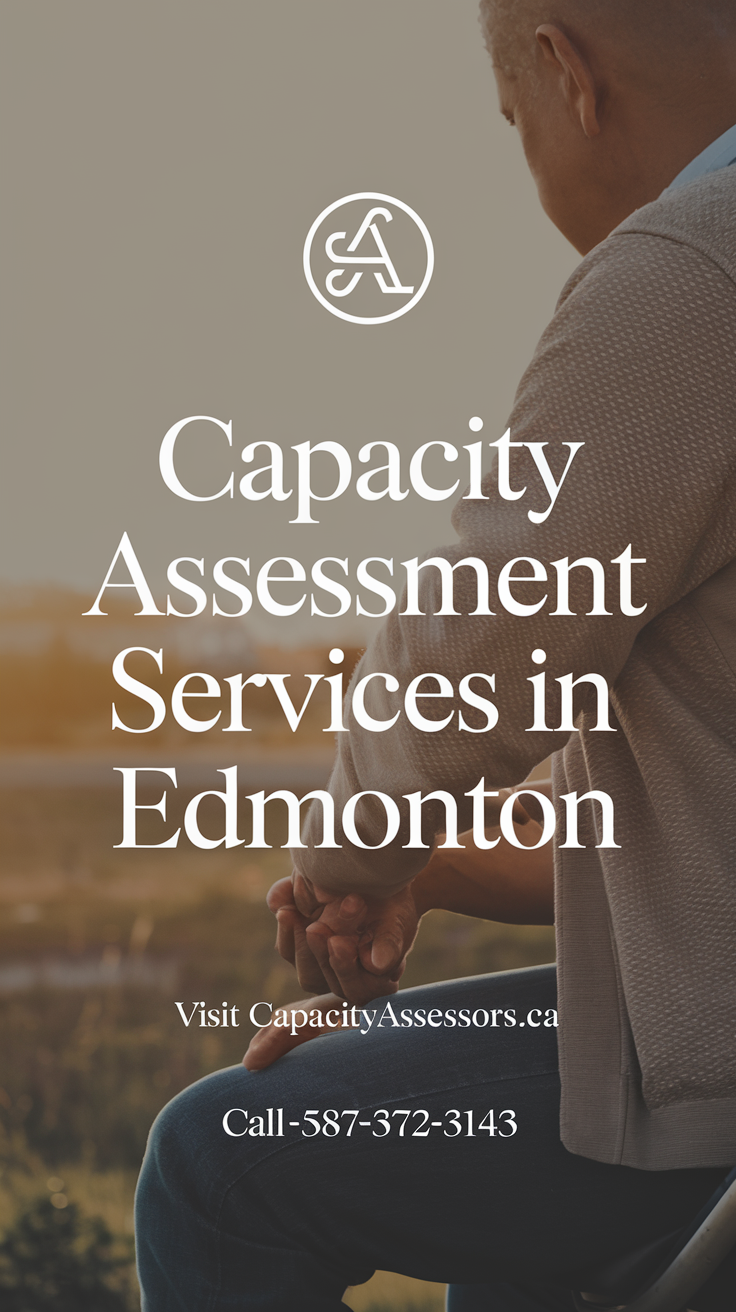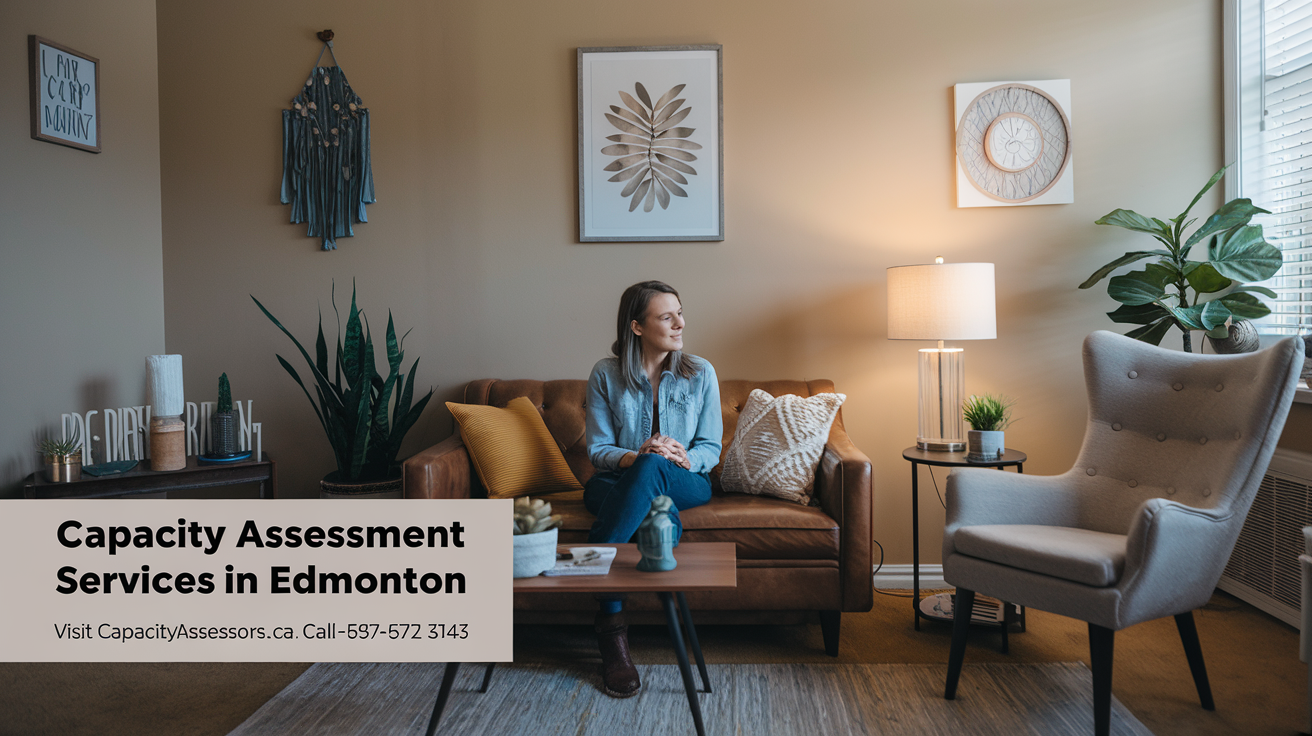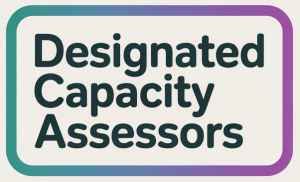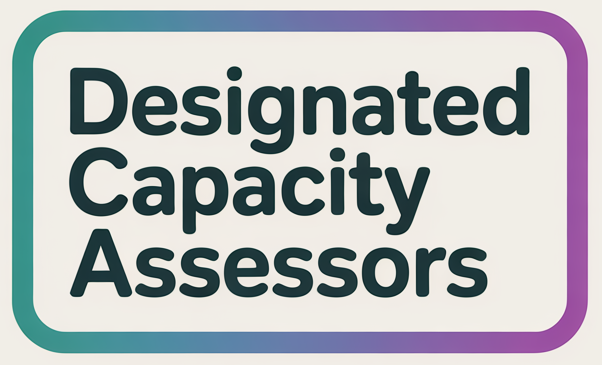Beyond the Form: Real Stories and Expert Guidance for Capacity Assessment in Greater Edmonton

A few years ago, someone close to me faced a sudden challenge—her mental health declined and her ability to make decisions about her finances and healthcare came into question. Navigating the maze of forms, legal terms, and emotional uncertainty led me to discover the real difference a designated capacity assessor can make. It’s not just a checkbox exercise; it’s a meaningful moment for families aching for clarity and compassion. If you’re in the greater Edmonton area and planning for a capacity assessment, I want to share what I learned, the questions I wish I’d asked, and how local experts like those at capacityassessors.ca now make this process far more approachable than you might think.
The Real Reason Behind Capacity Assessment Form 4: When It Hits Home
Last winter, my aunt started leaving the stove on. Small things at first—forgetting where she put her keys, repeating the same story twice in one conversation. Then came the morning she called me three times asking about the same doctor’s appointment. That’s when I realized we needed help, and fast.
Many families are surprised by how sudden the need for a capacity assessment form 4 arises. One day everything seems manageable, the next you’re frantically researching legal requirements while trying to protect someone you love. The thing is, capacity assessment form 4 isn’t just another bureaucratic hurdle—it’s actually about preserving dignity.
My aunt’s memory started fading fast, but we needed direction, not just a checkmark on a form. Research shows that capacity assessments can be triggered by noticeable declines or medical crises, but the emotional weight of that moment hits differently when it’s your family member struggling to remember your name.
Who Really Decides When Assessment Is Needed?
Here’s what surprised me most: it’s rarely a solo decision. Family members notice changes. Doctors express concerns. Sometimes banks flag unusual transactions. The decision usually emerges from multiple observations converging at once. Designated capacity assessors are crucial for legal compliance in Alberta, but the journey to that assessment often starts with people who care.
Not all professionals can complete form 4—designated capacity assessors are legally required. I learned this the hard way when our family doctor, despite knowing my aunt for years, couldn’t provide the assessment we needed. We had to find someone specifically trained and legally authorized to conduct these evaluations.
Setting the Stage for What Comes Next
The capacity assessment sets the stage for guardianship or trusteeship if required. Form 4 is foundational to guardianship and trusteeship applications, serving as the legal cornerstone that determines whether someone needs support making decisions about their health, finances, or personal care.
But here’s the reality: not all assessors are equal. Some rush through the process, treating it like a checklist. Others take time to actually listen. When I was searching for help in the greater Edmonton area, I needed someone who understood that behind every form was a real person with decades of memories, relationships, and preferences.
“Just because a form is required doesn’t mean the process should feel cold or detached.” – Mukesh Mishra
This quote resonates because the process is emotionally charged—engagement matters as much as expertise. Personal experiences often drive the urgency for starting the assessment process, and families deserve assessors who recognize this human element.
Finding the Right Support
When I finally connected with designated capacity assessors who understood both the legal requirements and the emotional complexity, everything changed. Professional assessors like those at capacityassessors.ca work throughout the greater Edmonton area, including Sherwood Park, Fort Saskatchewan, Leduc, Wetaskiwin, Camrose, Redwater, Devon, Spruce Grove, and Stony Plain.
The right assessor transforms what could be a sterile bureaucratic process into something more human. They explain each step, answer family questions, and treat the individual being assessed with respect and dignity. Guardianship services that begin with thoughtful, thorough assessments create better outcomes for everyone involved.
My aunt’s assessment wasn’t just about determining her capacity—it was about ensuring she received appropriate support while maintaining as much autonomy as possible. That’s what capacity assessment form 4 really accomplishes when done right: it safeguards rights while opening doors to necessary assistance.
If you’re facing this situation, don’t wait. The sooner you connect with qualified professionals, the better equipped you’ll be to navigate what’s ahead.
Meet the Experts: Why Designated Capacity Assessors Make All the Difference
When families face difficult decisions about a loved one’s capacity, they need more than just paperwork—they need an expert who understands both the legal requirements and the human side of these challenging situations. That’s where designated capacity assessors like Mukesh Mishra, RCSW, MSW, DCA, become invaluable allies in the process.
Mukesh Mishra isn’t just another professional with credentials after his name. He’s an anchor during some of life’s most stressful transitions, combining years of clinical experience with the specialized training required for DCA status. As he puts it:
“In times of family uncertainty, our job is to bring both expertise and humanity to the table.”
Understanding DCA Status Under Alberta’s AGTA
Not every social worker or therapist can conduct capacity assessments in Alberta. The designation is heavily regulated under the Adult Guardianship and Trusteeship Act (AGTA), which specifically requires that only professionals with DCA (Designated Capacity Assessor) status can complete legally binding capacity evaluations.
This isn’t just bureaucratic red tape. Legal compliance demands assessment by a DCA, and this requirement exists to protect vulnerable adults and ensure assessments meet rigorous professional standards. The designation means these professionals have received specialized training in capacity assessment methodology, understand the legal implications of their findings, and can provide testimony in court if needed.
Local Expertise That Makes a Difference
The team at capacityassessors.ca brings something unique to Edmonton services—intimate knowledge of the communities they serve. Whether you’re in Sherwood Park, Fort Saskatchewan, Leduc, Wetaskiwin, Camrose, Redwater, Devon, Spruce Grove, Stony Plain, Gibbons, or other surrounding areas, these assessors understand the local landscape.
This local expertise proves critical for follow-up support. When an assessment is complete, families often need guidance on community resources, healthcare options, or legal services in their specific area. A DCA status therapist who knows the region can provide targeted recommendations that actually fit your circumstances.
Communication Without the Confusion
One of the most valuable aspects of working with experienced designated capacity assessors is their ability to explain complex processes in plain language. These professionals understand that families are often overwhelmed, dealing with emotional stress while trying to navigate unfamiliar legal territory.
The assessors at capacityassessors.ca make it their priority to explain options, process, and next steps—minus the jargon, plus the empathy. They walk families through every step of the assessment process, addressing concerns and answering questions in ways that actually make sense to people who aren’t legal or healthcare professionals.
Preventing Costly Legal Mistakes
Perhaps most importantly, working with a designated assessor prevents costly legal do-overs. Research shows that reputable assessors can walk families through every step, reducing confusion and stress while ensuring the assessment meets all legal requirements from the start.
When capacity assessments don’t meet AGTA standards, families may face delays, additional costs, and the emotional toll of having to repeat the process. The expertise that comes with proper DCA designation helps ensure the assessment is done right the first time.
The combination of regulatory compliance, local knowledge, and compassionate communication makes designated capacity assessors an essential resource for families in Greater Edmonton. These professionals bring both the technical expertise required by law and the human understanding needed during difficult transitions.
When you’re ready to move forward with a capacity assessment, the team at capacityassessors.ca offers the designated expertise and local knowledge that can make all the difference in your family’s experience.
From Hesitation to Action: Demystifying the Capacity Assessment Process
I understand the knot in your stomach when you first consider a capacity assessment. The uncertainty, the questions, the fear of judgment—these feelings are completely normal. Having guided countless families through this process across Greater Edmonton, I can tell you that the assessment process is far more supportive than most people expect.
Pre-Assessment Consults: Your Safety Net
Before we dive into any formal assessment, I always encourage pre-assessment consults. Yes, you’re absolutely allowed to ask those awkward questions that keep you up at night. “Will this hurt my loved one’s feelings?” “What if they refuse to participate?” “How long does this actually take?” These aren’t just valid questions—they’re essential ones.
Research shows that clear communication and flexibility are hallmarks of good assessment services. During our initial conversations, I make sure you understand every step. No surprises, no hidden procedures. This transparency helps calm nerves and builds the foundation for a successful assessment process.
The Step-by-Step Assessment Process
The Edmonton services we provide follow a structured yet flexible approach. Initial contact involves understanding your specific situation and needs. Are we looking at healthcare decisions, financial management, or both? This information gathering phase is crucial—it avoids surprises on assessment day and ensures I bring the right tools and approach.
The actual assessment varies depending on individual circumstances. Sometimes it’s a single session, other times we need multiple interactions. What remains constant is our collaborative approach. This isn’t an interrogation where I fire questions at your loved one. Instead, it’s a dialogue where we explore decision-making abilities together.
In-Home Capacity Assessment: Comfort Meets Convenience
In-home evaluations are increasingly popular across Greater Edmonton area, from Sherwood Park to Fort Saskatchewan, Leduc to Wetaskiwin. There’s something powerful about conducting assessments in familiar surroundings. People are more relaxed, more themselves. Research indicates that in-home evaluations increase accessibility, particularly for vulnerable or immobile individuals.
Whether you’re in Camrose, Redwater, Devon, Spruce Grove, or Stony Plain, I bring the assessment to you. This flexibility eliminates transportation stress and allows your loved one to demonstrate their capabilities in their own environment.
A Collaborative, Not Confrontational Process
Many worry about being judged during capacity assessments. Good assessors foster safe, open conversations. I’ve seen families initially approach this process with defensive walls up, only to discover that we’re all working toward the same goal—understanding and protecting their loved one’s best interests.
As Mukesh Mishra, our designated capacity assessor, often says:
“Transparency keeps families informed and engaged, not left in the dark.”
This philosophy guides every interaction we have.
The Capacity Assessment Report: Your Legal Foundation
Every assessment culminates in a detailed Capacity Assessment Report (CAR). This isn’t just paperwork—it’s a crucial document for legal and care planning. The report provides clear findings about decision-making abilities and recommendations for support.
These reports are often used to support guardianship or trusteeship court applications. They’re recognized by Alberta courts and provide the legal foundation for important decisions about your loved one’s future care and protection.
Taking the Next Step
The capacity assessment process doesn’t have to feel overwhelming. With proper guidance, clear communication, and the right professional support, it becomes a manageable step toward ensuring your loved one’s safety and well-being.
Ready to move from hesitation to action? Visit capacityassessors.ca or call 587-372-3143 to schedule your pre-assessment consultation. We serve the entire Greater Edmonton area and are here to guide you through every step of this important process.

Patient-Centred, Always: Why the Right Approach Matters
When someone needs a capacity assessment, they’re often facing one of the most vulnerable moments in their life. The difference between a cold, clinical evaluation and a truly patient-centred approach can transform what feels like an interrogation into a supportive experience that honors their dignity.
A capacity assessment should prioritize the individual’s dignity and rights—not just ticking off a checklist. I’ve seen too many cases where assessors rush through forms, treating people like medical conditions rather than human beings with complex emotions and valid concerns. This approach misses the entire point of what we’re trying to accomplish.
“The person, not the paperwork, is always at the center of a true assessment.” – Mukesh Mishra
This philosophy drives everything we do at capacityassessors.ca. Our designated capacity assessors, including experienced professionals like Mukesh Mishra—an RCSW MSW therapist with DCA status—understand that ethical considerations must guide every interaction. It’s not about being a gatekeeper or detective; it’s about being an advocate who ensures the process respects the individual at every stage.
The Real Impact of Kindness
Let me share a story that illustrates why approach matters so much. One client came to us terrified about the assessment process. She’d heard horror stories about invasive questioning and felt like she was being judged as incompetent before anyone even met her. Her fear was palpable during our initial phone call.
When Mukesh Mishra arrived at her home in Sherwood Park, he spent the first twenty minutes just talking with her about her garden. No forms, no formal questions—just genuine human connection. By the time the actual assessment began, her fear had transformed into relief. She felt heard, respected, and understood that this wasn’t about taking away her autonomy but about ensuring she had the right support in place.
That’s the power of a patient-centred approach. Research shows that when we prioritize the individual’s comfort and dignity, we achieve better outcomes for both the person and their circle of care.
Support Services That Go the Distance
Patient-centred care extends far beyond the assessment room. Support services become crucial during what can be an emotionally challenging time. From the moment someone calls our line at 587-372-3143, they’re connected with professionals who understand that follow-up support matters just as much as the initial evaluation.
We serve the greater Edmonton area, including communities like Fort Saskatchewan, Leduc, Wetaskiwin, Camrose, Redwater, Devon, Spruce Grove, Stony Plain, and Gibbons. But geography isn’t what matters most—it’s ensuring that every individual, regardless of where they live, receives the same compassionate, thorough care.
Support doesn’t end when the report is filed. Families often need ongoing guidance about what the assessment means, how to implement recommendations, and where to find additional resources. This is where reputable agencies like capacityassessors.ca distinguish themselves by integrating ethical best practices into every case, not just during the formal assessment period.
Built-In Support From Start to Finish
Our support services are built into the entire process—from initial contact through post-assessment guidance. We understand that navigating capacity assessments can feel overwhelming, especially when families are already dealing with health challenges or difficult decisions about care.
The difference between a good assessment and a great one often comes down to these seemingly small details: taking time to explain the process, answering questions without judgment, and ensuring that everyone involved understands next steps. It’s about treating each person as an individual with unique needs, not as another case file to process.
When you’re ready to book an appointment, visit capacityassessors.ca or call us directly. Because everyone deserves an assessment process that honors their dignity while providing the clarity and support they need.
Navigating Legalities: What You Need to Know About Guardianship and Trusteeship
When families face difficult decisions about a loved one’s capacity, the legal landscape can feel overwhelming. I’ve seen countless families struggle with understanding the difference between guardianship services and trusteeship services, often learning too late that these are distinct legal pathways with unique requirements.
The foundation of any legal proceeding in Alberta starts with Capacity Assessment Form 4. This isn’t just paperwork—it’s the cornerstone that determines whether guardianship or trusteeship applications will succeed. Research shows that AGTA compliance is non-negotiable for legal guardianship/trusteeship, and shortcuts at this stage inevitably lead to costly delays and legal headaches down the road.
Understanding the Critical Differences
Many families don’t realize that guardianship and trusteeship serve different purposes. Guardianship services focus on personal and health decisions—where someone lives, what medical treatments they receive, and day-to-day care choices. Trusteeship services, on the other hand, deal exclusively with financial matters—managing assets, paying bills, and making investment decisions.
This distinction matters because the capacity assessment report must address the specific areas where support is needed. I’ve worked with families who assumed one assessment covered everything, only to discover they needed separate evaluations for different aspects of decision-making capacity.
The AGTA Framework: No Room for Shortcuts
The Adult Guardianship and Trusteeship Act outlines strict requirements that cannot be bypassed. Alberta courts will not accept assessments completed by non-designated assessors—a hard lesson some families learn after investing time and money in invalid reports.
As Mukesh Mishra, one of our designated capacity assessors, often tells families:
“The legal process is only as strong as the report it’s built on.”
This reality underscores why choosing the right assessor from the start is crucial for legal compliance AGTA standards demand.
What Lawyers and Courts Actually Need
Legal professionals require the official capacity assessment report as part of their process, but not all reports are created equal. Courts scrutinize these documents carefully, looking for specific evidence and conclusions that align with AGTA requirements.
I’ve noticed that lawyers appreciate when families come prepared with properly completed assessments. It streamlines the entire legal process and reduces the likelihood of requests for additional documentation or clarification.
Understanding the Investment
The cost of capacity assessments varies based on scope. A guardianship or co-decision assessment typically runs around $500, while guardianship plus trusteeship assessments cost approximately $700. While these fees might seem significant, studies indicate that legal costs may vary—an accurate assessment can prevent expensive repeat work.
Some families initially balk at the cost, but I’ve seen the alternative. Inadequate assessments lead to court challenges, additional legal fees, and prolonged uncertainty for everyone involved.
Planning Beyond the Assessment
Legal pathways are triggered by the assessment outcome, so families need to plan ahead with the right documents. At capacityassessors.ca, we don’t just complete the assessment—we guide families through both the evaluation process and the next steps post-report.
Our team, including designated capacity assessors like Mukesh Mishra with RCSW, MSW, and DCA credentials, serves the greater Edmonton area including Sherwood Park, Fort Saskatchewan, Leduc, Wetaskiwin, Camrose, and surrounding communities. We understand that legal accuracy is essential, which is why our reports consistently meet AGTA and court standards in Alberta.
For families ready to begin this process, booking an appointment at capacityassessors.ca or calling 587-372-3143 ensures you’re starting with the right foundation for whatever legal pathway lies ahead.
From Booking to Support: Making Your Next Step Easy (and Relatable)
Let’s be honest—the idea of scheduling a capacity assessment can feel overwhelming. You’re already dealing with complex family situations, legal requirements, and emotional stress. The last thing you need is a complicated booking process that leaves you more frustrated than when you started.
That’s exactly why I want to walk you through how straightforward getting help actually is. Research shows that easy booking and approachable communication lowers barriers to getting help, and that’s precisely what we’ve built into our Edmonton services at capacityassessors.ca.
Skip the Phone Tag—Book Online When It Works for You
Online booking is available—no endless phone tag required. I know how draining it can be to play telephone with busy offices during business hours when you’re juggling work, family, and everything else. That’s why our platform at capacityassessors.ca lets you book your appointment whenever it’s convenient for you.
Visit https://capacityassessors.ca/book-appointment-for-capacity-assessment/ and you’ll find the process is refreshingly simple. No confusing forms or hidden requirements. Just clear steps that walk you through exactly what you need to know.
Real People, Real Support—Not Just Automated Responses
But here’s something that matters even more than convenience: when you need to talk to someone, you actually get to talk to someone. Call 587-372-3143 for support or with questions—real humans on the line! Not chatbots, not endless menu options, but actual people who understand what you’re going through.
“There’s always a person ready to answer when you’re ready to take the next step.” – Mukesh Mishra
This personal touch matters, even when booking online or by phone. Whether you’re calling from Sherwood Park, Fort Saskatchewan, Leduc, Wetaskiwin, Camrose, Red Water, Devon, Spruce Grove, Stony Plain, or anywhere else in the greater Edmonton area, you’ll get the same level of personal attention.
Flexible Appointments That Actually Work for Your Life
Appointments are flexible and accessible for all communities in greater Edmonton. I’ve seen too many people postpone getting help because services weren’t available in their area or didn’t fit their schedule. That’s not the case here.
Our designated capacity assessors, including professionals like Mukesh Mishra—an RCSW MSW therapist with DCA status—understand that life doesn’t stop for assessments. We work around your schedule, not the other way around.
No More Confusion—Clear Guidance Every Step of the Way
The capacityassessors.ca platform demystifies the process, step by step. You won’t be left wondering what comes next or what’s expected of you. Each stage is explained clearly, from initial booking through your actual assessment.
This transparency matters because support is built into every stage, not just the assessment. You’re not just getting a service—you’re getting guidance through what can be a complex process.
Support That Continues Beyond Your Appointment
Here’s something that sets our support services apart: after your appointment, follow-up support is just a call away—no one is left hanging. This isn’t a one-and-done interaction. Long-term support is available because we understand that questions often come up after you’ve had time to process everything.
Whether you need clarification on your assessment results, help understanding next steps, or just want to talk through your options, that same phone number—587-372-3143—connects you to people who already know your situation.
Taking the next step doesn’t have to feel overwhelming. The combination of convenient online booking, real human support, and ongoing guidance makes what could be a daunting process feel manageable and, dare I say, even approachable.
Wild Card: What If Capacity Assessment Was as Familiar as a Dental Checkup? (And Why It Isn’t)
Last month, I got annoyed at myself for forgetting to book my dental cleaning. It’s routine—I know exactly what to expect, when to schedule it, and why it matters. But when I first encountered Form 4 for capacity assessment, I felt completely lost. Why is one health check so normalized while the other feels wrapped in mystery?
Imagine if we prepared for capacity assessment the same way we approach dental or eye exams—routine, expected, completely stigma-free. Picture calling to book an appointment without anxiety, knowing exactly what the process involves, and viewing it as proactive care rather than a crisis response. This isn’t just wishful thinking. It’s exactly what professionals like Mukesh Mishra and the team at capacityassessors.ca are working toward in Greater Edmonton.
Breaking Down the Stigma Barrier
The stigma around mental capacity assessment persists for several reasons. Unlike physical health checks, capacity assessments touch on deeply personal fears about independence, aging, and mental health. Research shows that reducing stigma encourages more people to seek proactive help, yet many families only discover these services during crisis situations.
Mental health stigma still clouds capacity assessment, but transparency helps reduce fear. When I speak with families in Sherwood Park, Fort Saskatchewan, or Leduc, I often see the same pattern—initial anxiety followed by relief once they understand the process. The mystery creates more stress than the actual assessment.
The Power of Education and Familiarity
Local experts are changing the narrative through education and compassionate service delivery. In-home capacity assessment services make the process more comfortable and accessible. When professionals come to your own environment—whether that’s in Edmonton, Wetaskiwin, or Camrose—it removes barriers and creates a more natural setting for evaluation.
As Mukesh Mishra, a designated capacity assessor with RCSW MSW credentials, explains:
“When families understand what’s involved, fear turns to relief.”
This transformation happens when we prioritize educational outreach as much as legal compliance.
Proactive Care, Not Crisis Management
Normalizing assessments could mean earlier, better outcomes for families and individuals. Think about it—we don’t wait for tooth pain to visit the dentist. We shouldn’t wait for a crisis to consider capacity assessment either. Early intervention often leads to better outcomes and more options for everyone involved.
The patient-centred approach emphasizes individual needs and rights throughout the process. This means treating each person with dignity, explaining every step clearly, and ensuring they feel heard and respected. It’s about making the experience as comfortable and understandable as possible.
Making Assessment Accessible Across Greater Edmonton
Services now extend throughout Greater Edmonton, including Redwater, Devon, Spruce Grove, Stony Plain, and Gibbons. By offering online booking at capacityassessors.ca or calling 587-372-3143, the process becomes as straightforward as scheduling any other health appointment.
Changing perceptions requires both community education and compassionate professionals who understand that this work is about more than legal compliance—it’s about supporting families during challenging times.
Looking Forward
By making capacity assessment approachable and familiar, we’re helping shift public perception and lower barriers to early intervention. The goal isn’t just to complete forms or meet legal requirements. It’s to create a system where families feel supported, informed, and empowered to make the best decisions for their loved ones.
When capacity assessment becomes as routine and understood as a dental checkup, we’ll have succeeded in removing unnecessary fear and creating better outcomes for everyone involved. That’s the future we’re building, one assessment at a time.
TL;DR: Capacity assessments aren’t just paperwork—they’re a vital step in protecting loved ones and planning for the future. In the Edmonton area, capacityassessors.ca offers designated, highly-qualified assessors like Mukesh Mishra to guide you every step of the way—from booking to final report. If you’re unsure what comes next, reach out for support and expert advice.
Share this :

We provide Capacity Assessment Service in Greater Edmonton Area and 1-2 hrs driving distance from Edmonton .






